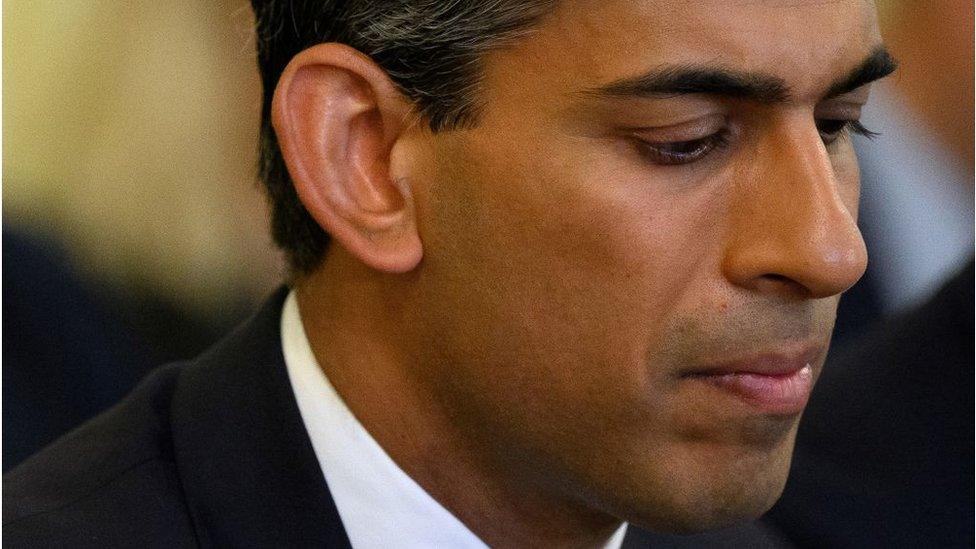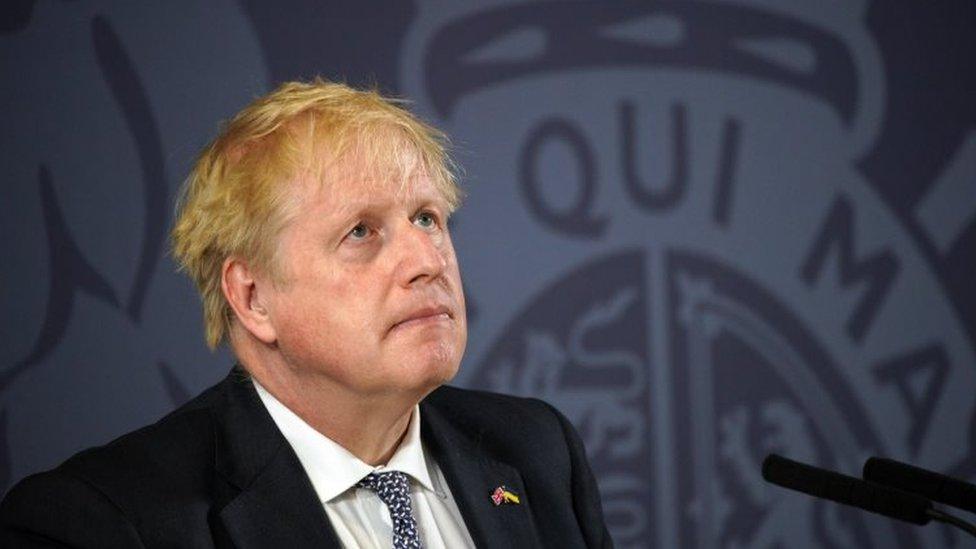Rishi Sunak accused of wasting billions servicing government debt
- Published
- comments

Rishi Sunak has been accused of failing to act to save billions of taxpayers' money that has been used to pay interest on government debt.
The National Institute of Economic and Social Research think tank said the losses were due to the Treasury failing to insure against interest rate rises.
It meant higher than necessary payments on £900bn of reserves created through the quantitative easing (QE) programme.
The Treasury said it was the Bank of England's role to decide QE measures.
The Bank of England is independent from the Treasury.
The Treasury said NIESR's proposal would undermine this independence and be "hugely damaging" to the credibility of how public finances were managed.
"Proposals such as this risk undermining the independence of the Bank of England and forcing commercial banks to swap reserves for gilts would be an act of financial repression," a Treasury spokesperson said.
NIESR's Prof Jagjit Chadha, told the Financial Times, external that Mr Sunak's failure to act had left the country with "an enormous bill and heavy continuing exposure to interest rate risk".
The Bank of England created £895bn of money through quantitative easing. Most of this was used to buy government bonds from pension funds and other investors.
When those investors put the proceeds in commercial bank deposits at the Bank, it had to pay interest at its official interest rate.
Last year, when the official rate was still 0.1%, NIESR said the government should have insured the cost of servicing this debt against the risk of rising interest rates.
It said interest payments have "now become much more expensive" and it estimates the loss over the past year at around £11bn, external.
"Such a lost opportunity is an unnecessary cost to the public finances at a very difficult time," the think tank said.
It suggested converting the debt into government bonds with longer to pay it back.
"It would have been much better to have reduced the scale of short-term liabilities earlier, as we have argued for some time, and to exploit the benefits of longer-term debt issuance. This is very much a question for the Treasury to answer," said Prof Chadha.
The Treasury said it would not have been commercially viable to convert such a high level of debt.
"The £11bn figure is based on the implausible assumption that it would be possible to undertake action of this scale in a single transaction," it added.


While there never was a single moment where the Treasury made a decision that cost the nation £11bn, the analysis from the National Institute of Economic and Social Research does point to some costly missed opportunities.
Early last year the Treasury itself was pointing towards the shortening maturity of our national debt as a by-product of the pandemic expansion of borrowing and the Bank of England's QE policy. The UK has for the past two decades had, by international standards, many more years to repay its loans from the markets, but that was no longer the case. The Treasury was trying to explain why despite the UK borrowing record sums, interest costs were at record lows.
So a question arose - why don't they do something about it and lock-in then rock bottom interest rates for many years? It was suggested by NIESR, by Policy Exchange, by Boris Johnson's former economic adviser Gerard Lyons, among others.
The Treasury's answer is that to have done so would have interfered with the Bank of England's independence over its QE programme of buying bonds, and that it would have been commercially unviable to refinance £600bn of debt in the markets in one go. In addition, though we all know now that there has been a material rise in interest rates, back then, it would have been a bet.
In short, they say, they could not have done the transaction that would have "saved £11bn", and with the benefit of hindsight they might also have put money into gas futures or the used car market and "saved" many tens of billions more.
But the wider point does raise questions about missed opportunities. And as we enter a new era of rising interest rates, and the reversal of QE, or Quantitative Tightening, many of the fuzzy accounting questions over government debts could have a rather material impact on the economic numbers.

'Fast and loose'
Gerard Lyons, the former chief economic adviser to Boris Johnson when the prime minister was Mayor of London, tweeted that the issue was "all too predictable".
Dr Lyons, now a senior fellow at the Policy Exchange think tank, said the "UK should've locked into low rates, borrowing more longer dated debt and not over reliance on QE to fund the deficit".
But Simon French, chief economist at Panmure Gordon, tweeted that the "£11bn 'cost' should really be set against the £120bn 'benefit' that the QE process has so far yielded for the Exchequer".
"To be fair to NIESR in their paper of last year they do acknowledge this - but this seems to have been drowned out today."
Labour's shadow treasury minister Tulip Siddiq said: "These are astronomical sums for the chancellor to lose, and leaves working people picking up the cheque for his severe wastefulness while he hikes their taxes in the middle of a cost-of-living crisis.
"This government has played fast and loose with taxpayers' money. Britain deserves a government that respects public money and delivers for people across the country."
Related topics
- Published9 June 2022

- Published8 June 2022
